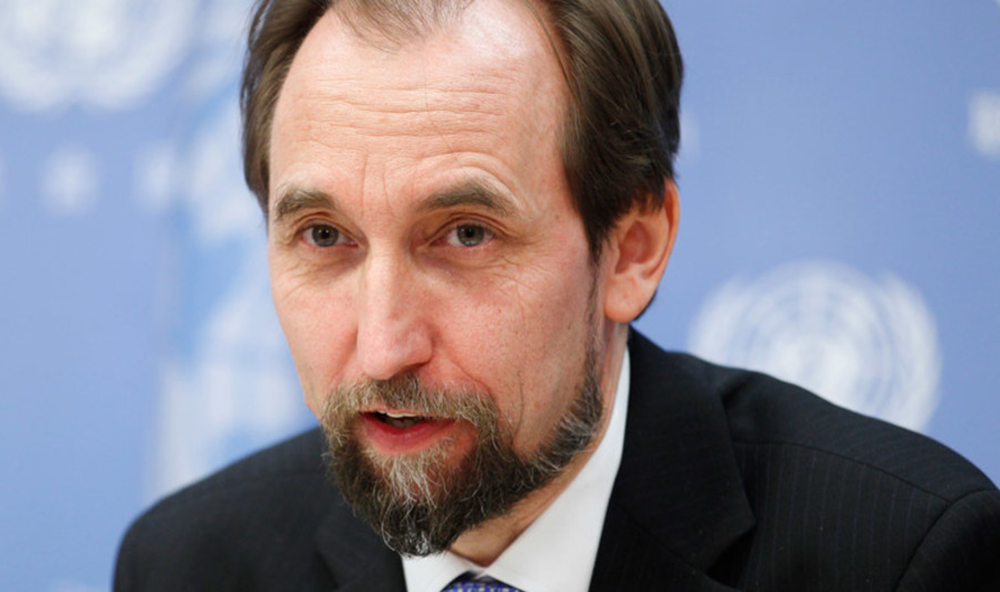Global leaders must prioritize protecting religious minorities against persecution and violence, Prince Zeid bin Ra’ad al-Hussein of Jordan said at a Thursday event.
Zeid served as United Nations high commissioner for human rights from 2014 to 2018, during which he condemned extremism in the Middle East, South America and Eastern Europe. He also assisted in the 2002 founding of the International Criminal Court, an intergovernmental judicial body that prosecutes global crimes against humanity. Zeid discussed the threats to coexisting belief systems at the March 5 event in Copley Formal Lounge.

Religious pluralism reveals the common humanity in all people that fanatical, violent organizations often obscure, according to Zeid.
“We as humans are much more complex,” Zeid said. “We are also better human beings than the extremists on both sides would have us believe.”
Attacks on worshippers and their religious spaces have pervaded the international religious landscape in recent years, according to Zeid. As the world faces ongoing attacks on Rohingya Muslims in Myanmar, violence against Uyghur Muslims in China, the publicly streamed mosque shooting in New Zealand, attacks on synagogues in the United States and church bombings in Egypt and Burkina Faso, the violence has desensitized society’s reaction, according to Zeid.
“The recent ongoing violence against believers or those of a different belief has been not short of numbing,” Zeid said.
Heads of state are typically responsible for leading the charge of violence against religious minorities, according to Zeid. They often instruct their citizens to target minority groups through lies and dog whistles, he said.
“Pick a target, and through a combination of half truths and insinuation, attack them, but indirectly, while allowing or quietly prompting your followers to do so directly, all the time denying you have anything to do with the violence when it results,” Zeid said. “The xenophobia, racism and religious intolerance does not also come out of nowhere; it feeds off of a less apparent structure of the state, discriminations and prejudices that already exist in practically all societies, and are amplified by the use of hypotheticals.”
Zeid was joined by panelists Asma Afsaruddin, a professor of near Eastern languages and culture at Indiana University Bloomington, John Borelli, the special assistant for Catholic identity and dialogue to University President John J. DeGioia (CAS ’79, GRD ’95) and Thomas Michel, vice president for academic affairs at the Xavier Learning Community in Chiang Rai, Thailand. The event, titled “The Challenge of Pluralism in the 21st Century,” was hosted by the Prince Alwaleed Bin Talal Center for Muslim-Christian Understanding.
Cooperation among people of different faiths combats ignorance regarding religious pluralism, according to Borelli.
“Ignorance, yes, is one of the items, one of the challenges that we face regarding religious pluralism,” Borelli said. “Some of that ignorance is addressed through education, and a lot of the ignorance can be overcome through action and acting together.”
Zeid served as the Jordanian ambassador to the U.N. and the United States before he was appointed U.N. high commissioner for human rights. During his tenure, he was noted for condemning xenophobic rhetoric, ranging from that of the Islamic State to that of world leaders like U.S. President Donald Trump and Marine Le Pen, the president of the French National Rally Party.
Working at the U.N. revealed the dysfunction among global forces when enforcing peace and security internationally, according to Zeid.
“For many years, I had an orchestra seat in the playhouse of international relations, the U.N. Headquarters in New York, watching at times with utter bewilderment for the cowardice, double standards and hypocrisy of states,” Zeid said. “I therefore have no illusions of what we are, or what harm we are capable of.”




















